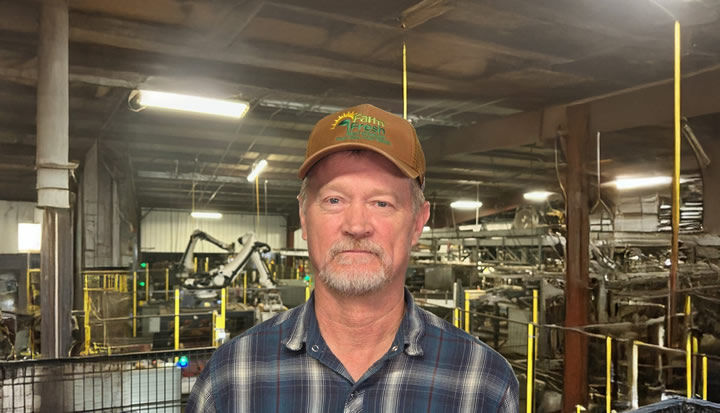Delivering Efficiency and Reliability: PECO Pallet's Role in Blanca Potato's Transition to Automated Material Handling

Rodney Smith has spent over 20 years in the potato industry and serves as the general manager of Blanca Potato, which supports five major potato farms in South Central Colorado's San Luis Valley. The company is one of the largest shippers of raw potatoes, processing about 2.2 million 50-pound bags annually for North America and beyond.
In the small farming community of Blanca, Smith faces challenges in recruiting and retaining workers for the physically demanding packing operation. Potatoes arrive in bulk, and the process of unloading, washing, grading, sorting, and packaging remains largely manual.
"Getting the potatoes into bags and crates, putting them onto pallets, has not changed a whole lot," Smith explains. "It is still mostly manual."
Recognizing the need for change, Smith began exploring automated material handling systems to replace manual labor with robotic equipment and conveyors. In Blanca's case, this shift promised to enhance efficiency and address staffing challenges for what was once a labor-intensive process of stacking packaged bags of potatoes on pallets and in crates and then moving them to other areas for shrink-wrapping, storage and shipping.
Embracing automation, working out the kinks.
"Now, through use of robotics and automated material handling systems, robotic arms are picking up packages and load them precisely on pallets," Smith explained. Then they move through a material handling line of roller conveyors to an automated palletizer, which then shrink-wraps the pallet. That completed and secured pallet then comes off the line and is moved by forklifts to storage and staging.
The roll out was not without a few hiccups, Smith recalled. During start-up, Smith immediately ran into an issue. "When we were manually processing, we were using a lesser grade of pallet," Smith said. "When we started up the automated system, those pallets (from a previous supplier) were failing at an alarming rate" as they went through the automated material handling line.
"We were seeing failure rates of up to 20 percent, shutting the line down as many as 20 times per day to clear out broken pallets which were obstructing the line and compromising the system," Smith noted.
With more manual intervention required to remove the broken pallets and restack the bags of potatoes on replacements, not only did that negate the projected savings from automated systems, but it also impacted throughput and put into question delivery commitments and available inventory.
Overcoming pallet failure.
In assessing the issue, Smith discovered he needed a pallet that adhered to more stringent specifications for precision construction, quality, durability and consistent performance. That's when he reached out to PECO Pallet (PECO).
"We needed more accuracy and consistency" in pallet reliability and performance, Smith noted. First, he ran a pilot to evaluate the PECO pallet's quality. The units ran through the system without failure and performed flawlessly. Next step was a full rollout, which also was successful.
"PECO provided pallets of the proper grade that can hold up to the rigors of the product and the automated material handling systems," Smith noted. "I think the difference is when these pallets go back to the depot for inspection and refurbishment, PECO does a thorough job of repair and bringing them back up to spec. That ensures we get a quality pallet that meets spec and doesn't fail in our system," he added.
Since introducing PECO's pallets and implementing them in the automated handling system, Smith estimates pallet failure rate has been near zero. Blanca utilizes some 50,000 pallets annually. "Over the course of a year, we're rejecting only about 120 of PECO's pallets – less than 1 percent," Smith calculated.
Smith added, "It's more efficient and has helped us alleviate some of the demand for labor. And with less pallet failure we can maintain consistent throughput and meet our customers' demands."
The value of pallet quality also extends to Blanca's end customers, retailers like Walmart. "They also have automated material handling in their distribution centers and require pallets that meet the proper spec and can run through their systems without failure," Smith added.
Benefits and lessons learned.
Among the benefits Smith has cited from going automated and employing PECO pallets have been lower labor costs, less pallet failure (and their associated costs) which improves and maintains consistent throughput, faster and more accurate response to customer needs, and higher customer satisfaction.
Farming is a tough, tight-margin business, so every opportunity in the farm-to-table cycle to reduce costs and improve efficiency and productivity helps those farmers sustain a profitable business, Smith says. "At the end of the day, that's what we are here to do, provide a cost-effective, reliable operation that helps farmers maximize their profits and get a quality product to retailers as efficiently as possible."
About PECO Pallet, Inc. – Itasca, IL-based PECO Pallet is one of North America's leaders in pallet rental services and provides tens of millions of its red block pallets to major grocery and consumer goods manufacturers in the U.S., Canada, and Mexico. PECO Pallet's tremendous growth over the last 25+ years reflects the company's commitment to quality and service. Customers using PECO's superior pallets experience less product damage, greater efficiency, improved safety, and significant cost savings. For more information about PECO Pallet, please visit http://www.pecopallet.com.
Comments (0)
This post does not have any comments. Be the first to leave a comment below.
Featured Product

